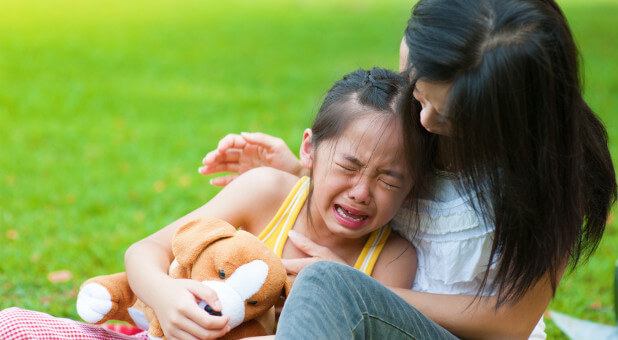My daughter looked unsure as to what to do with this confession, this unusual offering from her mother who rarely admitted any wrongdoing. I didn’t blame her for the skeptical look she gave me. I understood why she didn’t say anything back, but somewhere in those eyes I saw hope—hope that things could be different.
I desperately wanted things to be different too. It was time to stop being so hard on my child; it was time to stop being so hard on myself. I prayed I could stand up to the inner bully. I knew I needed an easy first step. I decided to use one simple word: Stop.
Within the hour, I had a chance to try it. The first critical thought that popped into my head arose as I was preparing to leave the house: I looked at my reflection and thought, “You look fat. You can’t go out looking like that.”
“Stop!” I assertively thought to myself, shutting down any further criticisms. Then I quickly turned away from the mirror and recited these words: “Only love today. Only love today.”
I used the same strategy when interacting with my child a few minutes later. Before any harsh words came out of my mouth about the way she was sloppily packing her bag of things, I cut off my inner critic by saying, “Stop! Only love today.” Then I swallowed the hurtful words and relaxed my disapproving face.
Within mere days of using the “stop” technique, I noticed a change. With a more positive thought process, it was easier to let go of the need to control, dictate and criticize. In response, my daughter began taking more chances and began revealing her true passions.
She started movie-making and website design on the computer. She made doll furniture and clothing to sell in the neighborhood. She began baking new recipes without any help.
Nothing she did was perfect. Nor was it mess-free or mistake-free, but the moment I said something positive, I saw her blossom a little more. That is when I began to clearly see beyond the mistakes and messes to what was truly important.
I began noticing my child’s inner beauty rather than looking for perfection on the outside.
I began paying more attention to the person she was rather than the successes she achieved.
I began letting her be who she was meant to be instead of some idealistic version I had in my head.
When I stopped being a bully to my child and myself, opportunities for growth and connection opened up. Over time, significant progress was made. In a little less than two years on my journey to let go of perfection and distraction, I received the confirmation I never thought I would receive.
My daughter was outside before school, tending to a garden she created smack dab in the middle of the yard. I watched from the kitchen window as she lovingly tended to her miniature plot. I was captivated by the utter joy on her face. She was clearly at peace.
Since my dad loves to garden and had taught my daughter a few things, I took a picture and sent it to my parents. Nothing could have prepared me for the gift I would receive in return.
My parents wrote, “Thank for this precious picture of our beautiful granddaughter. Over the last two years, we have seen a tremendous change in her. We no longer see a scared look in her eyes; she is less fearful about you being upset or impatient with her. She is much happier and more relaxed. She is thriving and growing into a content, creative and nurturing person. We know for a fact the changes we see in her coincide with the changes we have also seen in you.”
My friends, I have the following message to offer anyone who wants to believe today can be different than yesterday:
If you think that criticizing, belittling or critiquing yourself will make you smarter, fitter or more valuable, please reconsider.
If you think badgering, bullying or constantly correcting your child will make him or her more likable, more confident or more successful, please reconsider.
Because the truth is this:
It’s hard to love yourself with a bully breathing down your neck.
It’s hard to love yourself when the one person who’s supposed to love you unconditionally doesn’t.
It’s hard to become the person you’re supposed to be when you aren’t allowed to fall down and get back up.















































